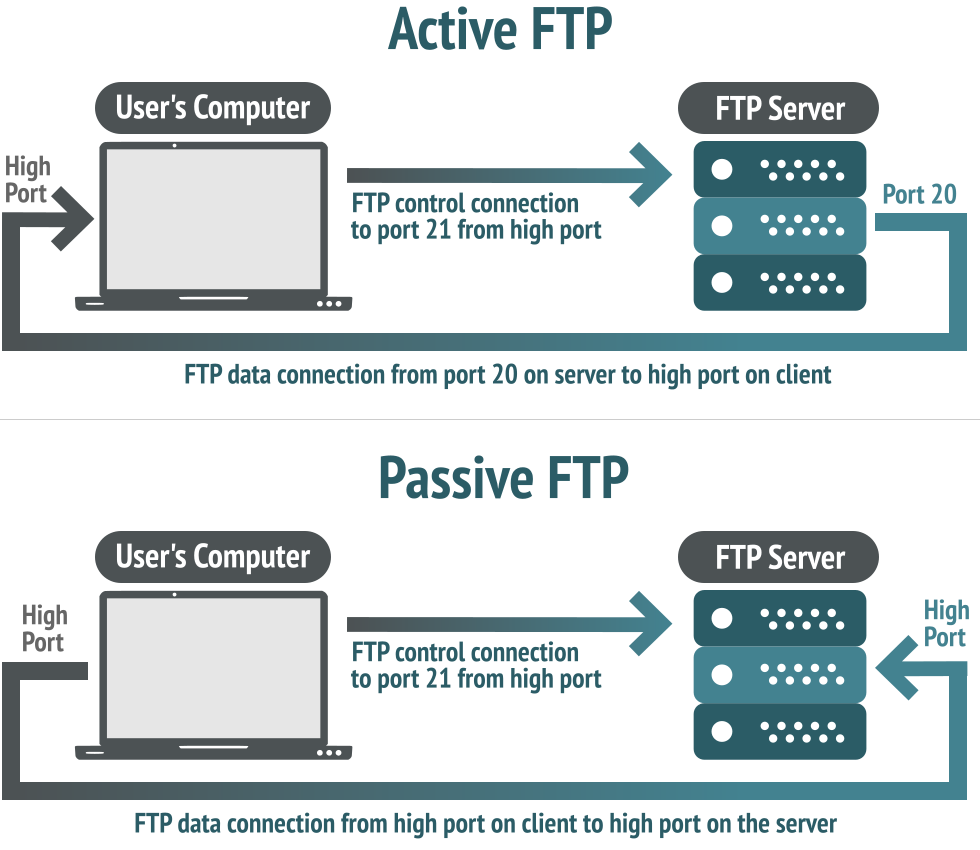Antwort Why SFTP is better than FTP? Weitere Antworten – Why should I use SFTP instead of FTP
What's the Difference Between FTP vs SFTP, Then The key difference between FTP vs SFTP is that SFTP uses a secure channel to transfer files while FTP doesn't. With SFTP, your connection is always secured and the data that moves between your FTP client and your web server is encrypted.Using SFTP, only one secure connection is established through which all data (authentication information, file data, etc.) is transmitted. SFTP ensures data integrity and data security by applying SSH2 Message Authentication Code (MAC) to hashed data payload packets, which are encrypted in the data stream.Secure File Transfer Protocol (SFTP) is a robust, reliable, and secure method for transferring files between businesses and individuals. Regardless of what industry your business operates, cyber threats are an ever-present reality. Employing SFTP ensures that your data is protected at all times.
Why FTP is not recommended as a file transfer protocol : FTP was not built to be secure. It is generally considered to be an insecure protocol because it relies on clear-text usernames and passwords for authentication and does not use encryption. Data sent via FTP is vulnerable to sniffing, spoofing, and brute force attacks, among other basic attack methods.
What are the weaknesses of SFTP
A third drawback of SFTP is that it can face firewall and proxy issues that can block or interfere with file transfers. Because SFTP uses SSH, it typically runs on port 22, which may not be open or allowed by some firewalls or proxies. This can prevent SFTP from establishing a connection or transferring data.
What is the downside of SFTP : Disadvantage: Performance
In many cases it can be even slower than FTP. For one thing, most SFTP clients send data in very small 32 KB chunks (this limitation can be manually increased within the software, but this process can be time-consuming).
SFTP is more secure than FTP, as it encrypts all data transferred between the client and server, including usernames and passwords. Additionally, SFTP requires user authentication, meaning that only authorized users have access to the data.
One of the most common SFTP vulnerabilities is weak authentication methods. If the authentication process is not robust enough, it becomes easier for attackers to bypass it and gain unauthorized access to the system. Outdated server software is another vulnerability that can be exploited by cybercriminals.
Is SFTP outdated
Many established frameworks still mandate the use of SFTP for specific types of data transmission. Additionally, there are many other compliance frameworks that recommend or require secure data transmission methods, including Secure File Transfer Protocol (SFTP).One of the most common SFTP vulnerabilities is weak authentication methods. If the authentication process is not robust enough, it becomes easier for attackers to bypass it and gain unauthorized access to the system. Outdated server software is another vulnerability that can be exploited by cybercriminals.SFTP is generally slower than FTP due to the security built into the protocol. The data is encrypted, which takes time, but perhaps more importantly the protocol itself functions differently; it's not "streamed" like FTP. One limitation of SFTP is that, being reliant on SSH, it requires authentication.
Mismatched Quotes or Brackets: The file contains mismatched quotation marks, brackets, or other delimiters, which can confuse the SFTP server's parsing mechanism and result in an "illegal quoting" error. File Corruption: The file may be corrupted or improperly formatted, leading to errors during the upload process.
Why is SFTP bad : Unlike other applications which can easily be 'digitally transformed' into cloud-served applications, SFTP doesn't lend itself easily to a cloud-based content transfer mechanism and is thus, is not a reliable option for file transfers when it comes to remote workforces.
What is SFTP weakness : One of the most common SFTP vulnerabilities is weak authentication methods. If the authentication process is not robust enough, it becomes easier for attackers to bypass it and gain unauthorized access to the system. Outdated server software is another vulnerability that can be exploited by cybercriminals.
Is SFTP dying
SFTP is still relevant in 2023 and is the only file transfer protocol that features inherent forward secrecy.







